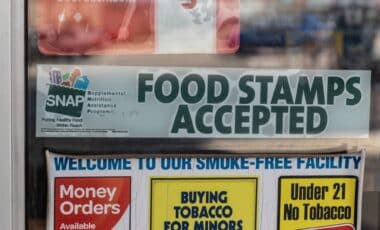The Department for Work and Pensions (DWP) is currently distributing its annual Christmas bonus to millions of recipients across the UK. The payment, set at £10, is provided to those on certain benefits, such as Pension Credit and Personal Independence Payment (PIP). However, criticism has emerged over its unchanged value since 1972, with inflation suggesting the payment would now be worth approximately £115.76.
An Unchanged Tradition Since Its Introduction in 1972
The Christmas bonus was introduced in 1972 to offer additional support during the festive period. Despite its long history, the bonus has only been increased once, temporarily, in 2008 to £70 to assist people during the financial crisis. The following year, the amount reverted to £10, where it has remained ever since.
The payment has sparked frustration and humour on social media. One person commented: “Merry Christmas everyone, just received my £10 DWP carers bonus will be careful not to spend it all at once.” Another remarked: “Just received my Pensioners Christmas Bonus from the DWP £10. Wow. Not ungrateful, but it probably costs more to administer than the actual benefit.”
When To Expect the Payment
The £10 Christmas bonus is processed automatically and should appear in eligible recipients’ bank accounts by January 1, labelled as “DWP XB” on bank statements. Importantly, this payment is tax-free and does not affect any other benefits.
Eligibility Criteria According to DWP
According to GOV.UK, “you have to be in receipt of one of the following benefits in the ‘qualifying week’ — which is usually the first full week of December — to get the Christmas bonus:”
- Adult Disability Payment
- Armed Forces Independence Payment
- Attendance Allowance
- Carer’s Allowance
- Child Disability Payment
- Constant Attendance Allowance (paid under Industrial Injuries or War Pensions schemes)
- Contribution-based Employment and Support Allowance (once the main phase of the benefit is entered after the first 13 weeks of claim)
- Disability Living Allowance
- Incapacity Benefit at the long-term rate
- Industrial Death Benefit (for widows or widowers)
- Mobility Supplement
- Pension Credit (the guarantee element)
- Personal Independence Payment (PIP)
- State Pension (including Graduated Retirement Benefit)
- Severe Disablement Allowance (transitionally protected)
- Unemployability Supplement or Allowance (paid under Industrial Injuries or War Pensions schemes)
- War Disablement Pension at State Pension age
- War Widow’s Pension
- Widowed Mother’s Allowance
- Widowed Parent’s Allowance
- Widow’s Pension
Recipients must also be present or ordinarily resident in the UK, the Channel Islands, the Isle of Man, or Gibraltar during this period. In the case of couples, both partners can receive the bonus if they each meet the criteria or if one partner qualifies through a benefit, and the other meets the specific age and residency requirements.
Limited Impact During a Cost-Of-Living Crisis
Despite its modest amount, the Christmas bonus is welcomed by some. One recipient shared online: “So excited- I got my £10 DWP Christmas bonus in my account this am! It’ll buy me a hot water bottle to keep me warm this winter.” This comment reflects both gratitude and the stark realities faced by those relying on such payments.
With inflation hitting hard, many have called for the bonus to be updated to better reflect current living costs. While its impact may be small, the DWP continues to uphold this long-standing tradition.










Will I get any extra money to help with heating. I receive the higher rate D L.A